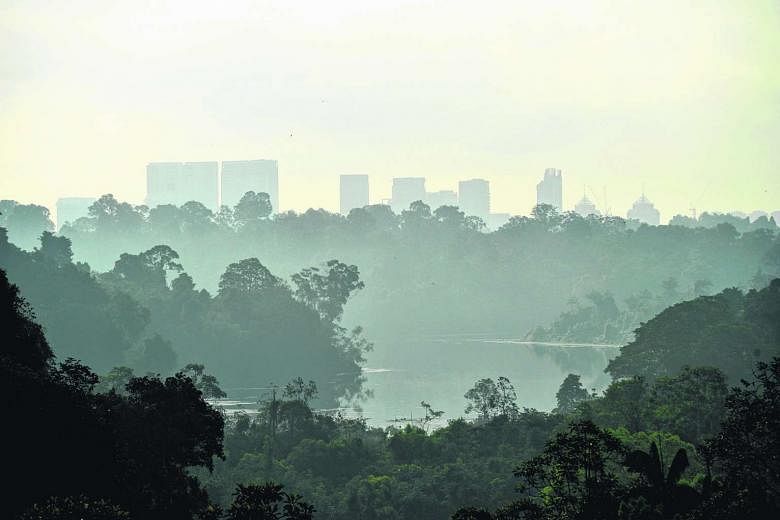SINGAPORE - Site investigation works needed to determine how a train tunnel can be built under Singapore's largest nature reserve will have a "small" impact on the area, even though the reserve is deemed highly sensitive.
This is because stringent mitigating measures will be adopted, said Senior Minister of State for National Development Desmond Lee in Parliament on Monday.
This was the assessment of the environmental consultants hired to assess the environmental impact of preliminary works for the upcoming Cross Island Line MRT project on the Central Catchment Nature Reserve.
Mr Lee was responding to Non-Constituency MP Leon Perera, who asked how the Government intends to mitigate the impact of site investigation works preceding the construction of the MRT line.
Overall, the independent environment impact assessment (EIA) done by consultancy Environmental Resources Management has determined that investigation works in the area would have a "moderate" impact on plants and animals there, but only if measures to reduce impact are strictly implemented.
Otherwise, the soil investigation works could have a large impact on the highly sensitive parts of the reserve, which comprises primary rainforest with ecologically sensitive habitats.
Mr Lee said stringent mitigating measures, developed in close consultation with several representatives of nature groups and the National Parks Board (NParks), have been proposed.
They include the use of enclosures to reduce engine noise and tanks to collect any discharge.
Site investigation works to determine the geological properties of the area will be done through two methods - borehole drilling and geophysical surveys - Mr Lee told the House.
For the former, boreholes about 10cm in diameter will be drilled into existing trails to extract vertical columns of soil samples. Confining this to existing trails will prevent surrounding vegetation from being affected, he said.
Drilling machines will also be modified to reduce noise and prevent spillage of slurry and fuel.
To minimise damage and disturbance to the forest, 16 boreholes will be drilled, instead of the earlier estimate of 72, he added.
To make up for having fewer soil samples, less intrusive geophysical surveys will also be carried out to supplement data collected from the boreholes.
This would involve surveyors going off-trail into the forest to collect data using hand-held equipment, Mr Lee said.
Although such geophysical surveys are of "significantly lower impact" than borehole drilling, he added, there are still concerns that surveyors may inadvertently trample on plants on the forest floor as they move through dense vegetation.
To guard against this, said Mr Lee, the geophysical survey will be limited to a 100m-wide corridor and will not be carried out in sensitive locations such as streams, swamps and dense vegetation.
NParks officers will supervise the surveyors full-time to ensure they adhere to the strict rules for moving around in off-trail forested areas.
All site investigation activities will also be restricted to daylight hours, so as not to affect nocturnal animals, Mr Lee said.
The 50km Cross Island Line to link Changi and Jurong by 2030 was first announced in early 2013, and preliminary plans showed it cutting through primary and secondary forests in the Central Catchment Nature Reserve near MacRitchie Reservoir.
But nature groups, alarmed by the construction and operation of an underground MRT line right across the heart of the reserve, suggested that the line be built around the reserve, along Lornie Road, to minimise environmental harm.
The environmental report has assessed that the impact of soil investigation works along Lornie Road would be "negligible", and "minor" for areas near Venus Drive and a golf course.
Further studies on the total impact of the MRT project are planned and will take four to five years to complete. A decision on the route of the Cross Island Line will only be made after the studies are done.
Biologist David Tan from the Love Our MacRitchie Forest volunteer group said Parliament has not adequately addressed the possibility of the mitigating measures failing, which would be a serious threat to the nature reserve.
"Also ignored is the principle of planning an infrastructural project through the nature reserve," he said


